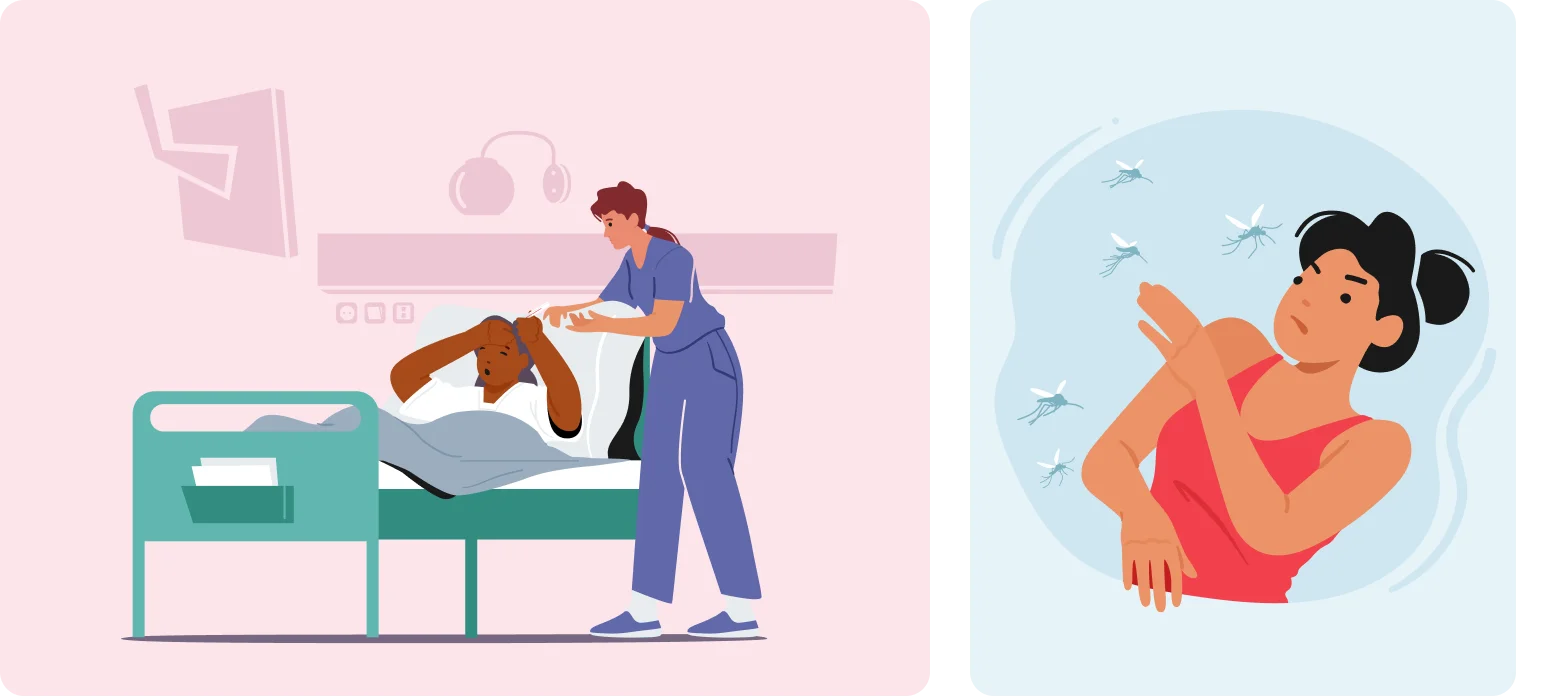Definition
Malaria is a serious, sometimes life-threatening infection caused by plasmodium parasites spread to humans by infected female Anopheles mosquitoes. Once inside the red blood cells, the parasites continue to multiply, leading to the destruction of the red blood cells. Malaria is most common in tropical and subtropical countries.
Anyone living in or traveling to areas where malaria is prevalent is at risk of contracting the disease, especially if they are visiting friends or relatives in those regions. However, pregnant women, babies and young children, people without a spleen, and people with weakened immune systems are particularly vulnerable.

Causes
Malaria is caused when an infected mosquito bites a person and injects the plasmodium parasites into the bloodstream. You can also catch it from exposure to infected blood through blood transfusions, sharing needles, or from mother to unborn child.
Symptoms
Symptoms typically appear within 7 to 15 days after the infected mosquito bite. Although in some cases they don’t occur for several months after travel. Symptoms of malaria can be hard to spot but usually include fever, chills, sweats, headache, body aches, nausea, and vomiting. In severe cases, it can lead to complications such as organ failure, anemia, and cerebral malaria, which can be fatal if not treated promptly.
Common symptoms include:
- High fever (Malaria should be considered in anyone with a fever within one year of travel to a high risk area)
- Chills & sweats
- Profuse sweating
- Headache
- Muscle & joint pain
- Fatigue (especially in children)
- Nausea & vomiting
- Sore throat
- Enlarged spleen
- Abdominal pain
- Rapid breathing or difficulty breathing
- Rapid heart rate
- Feeling confused
- Yellow skin or whites of the eyes
Prevention
The best way to avoid getting malaria is to avoid travelling to areas where it is present. However, if you do visit those areas, be sure to consult with your GP, nurse, pharmacist or travel clinic at least 4 to 6 weeks before you travel to find out if you need to take antimalarial tablets and to get advice on other prevention measures.
Common prevention measure include:
- Antimalarial medicine (usually taken from a few days or weeks before you travel through a few weeks after you get back)
- 50% DEET-based insect repellent
- Sleep under mosquito nets
- Wear clothes that cover your skin (long pants, long-sleeve shirts, etc.)
- Avoid standing water where mosquitos breed, or travel at time of high seasonal rainfall
- Avoid rural areas
- Avoid being outdoors between dusk and dawn
Antimalarial Medicines
You can get advice on malaria treatment from your GP, Pharmacist or Travel clinic. Antimalarial medications should always be taken alongside mosquito bite prevention measures. What you take will depend on factors such as the species of parasite, the severity of the infection, and drug resistance patterns. Note that you may be prescribed antimalarial medicine even if you’re travelling to a low-risk area.
Common antimalarial medicines include:
- Chloroquine
- Atovaquone-proguanil, may be used depending on local drug resistance patterns and the type of malaria parasite involved.
- Doxycycline
- Mefloquine
Treatment
Malaria needs to be treated quickly and usually under specialist care in hospital setting. You will be given a combination of antimalarial medications administered orally over a specified duration, usually ranging from 3 to 7 days. The choice of medication depends on factors such as the species of malaria parasite (strain of Plasmodium), the severity of the illness, and whether the infection is resistant to certain drugs.
Prompt and effective treatment not only helps to cure you but also reduces the risk of further transmission. If left untreated, or if treatment is delayed, malaria may be fatal.
The most common treatments include:
- Artemisinin combination therapy (ACT)
- Chloroquine
- Artemether and Lumefantrine
- Quinine
- Primaquine
Pharmacy Aids for Malaria Symptoms
OTC pharmacy medications may help alleviate some of your symptoms, such as fever, headache, and body aches, but remember they do not treat the underlying malaria infection.
Speak to your healthcare provider before taking any medicines to be sure they do not interfere with your malaria treatment.
Commonly used OTC medications for symptom relief include:
- Acetaminophen (paracetamol) can help reduce fever and alleviate mild to moderate pain.
- Non-steroidal anti-inflammatory drugs (NSAID) can also help reduce fever and relieve pain. However, NSAIDs should be used with caution in patients with a risk of complications such as bleeding or kidney dysfunction.
- Antihistamines may help alleviate symptoms of itching or allergic reactions.
FAQ
Where in the world is malaria most common?
The highest number of malaria occur in Sub-Saharan Africa, with over 90% of malaria cases and deaths occurring there. Other regions with high malaria prevalence include parts of South Asia, Southeast Asia, Central and South America, as well as parts of the Middle East and Oceania. Prevalence can vary within countries, with rural areas typically having higher rates of transmission compared to urban areas.
Should I take anti-malaria medication if I am pregnant?
Because pregnant women are highly susceptible to malaria, they should avoid travel completely to areas where malaria is present. If that is impossible, and you must travel, preventative treatment is available to reduce your risk. Some anti-malaria tablets aren’t safe to take in pregnancy so ask your GP for advice.
How do I know if I have malaria?
Malaria is diagnosed through blood tests to detect the presence of malaria parasites or specific antigens or proteins. Common malaria test include:
- Thick and think blood smears stabbed with Giemsa
- Rapid diagnostic tests (RDTs)
- Nucleic acid based tests including polymerase chain reaction (PCR)
More Info
To get more information about stress management, visit the NHS condition page.


























